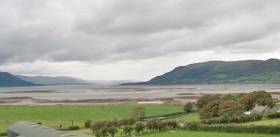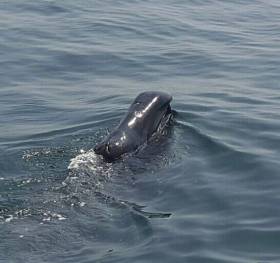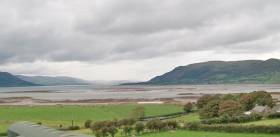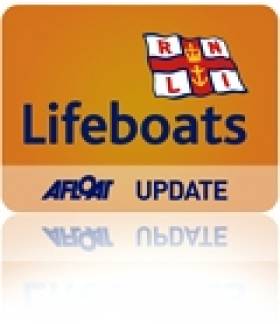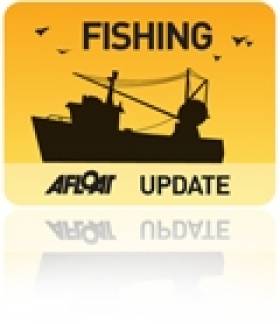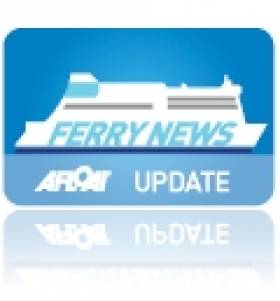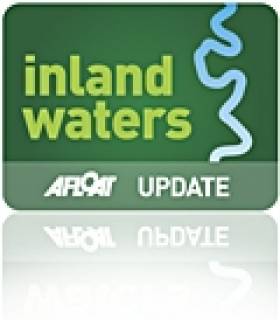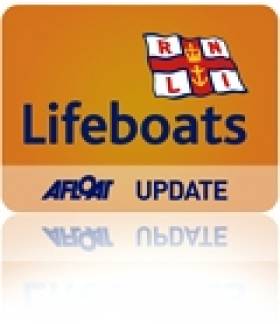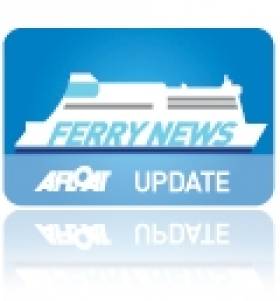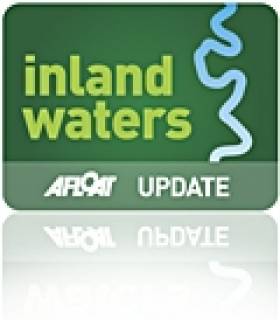Displaying items by tag: Carlingford Lough
Legal Challenge To Carlingford Ferry Rejected
#FerryNews - A legal challenge against a new car ferry route across Carlingford Lough has been rejected, according to the News Letter.
The route across the narrowest part of the lough between Greencastle in Co Down and Greenore in Co Louth was given the go-ahead in the summer of 2015 against the objections of some local residents – some of whom took their case to Belfast High Court requesting a judicial review against Newry, Mourne and Down District Council.
However, a case by one litigant was this week dismissed by Justice Adrian Colton, who said: “There is simply no expert evidence which begins to challenge the conclusions of the various environmental impact assessments which were carried out throughout the entire process.”
The complainant, who lodged her appeal in May this year, had accused the council and Northern Ireland’s Department of Agriculture, Environment and Rural Affairs of a flawed consultation and assessment process ahead of work on a new ferry terminal near her home in Greencastle.
But the judge declared her argument over protections for marine wildlife in the lough was “misplaced as a matter of law” as the area is not a designated Special Area of Conservation.
The News Letter has more on the story HERE.
#BowheadWhale - The search continues in tracking down the elusive bowhead whale that's excited marine wildlife experts since it was sighted in Carlingford Lough at the weekend.
One of a species never before recorded in Irish waters in the 25 years since the Irish Whale and Dolphin Group (IWDG) was formed, the 20ft juvenile whale was photographed from a pilot boat at the mouth of the lough at the Helly Hunter Rocks on Sunday 29 May.
It's thought that it may be the same individual from the arctic species spotted off Cornwall in mid May, following a previous bowhead sighting at the Scilly Isles in February.
The Celtic Mist joined the hunt yesterday (Tuesday 31 May) on its circumnavigation of Ireland and failed to make any sighting, though bowhead whales are known for being difficult to spot due to their lack of a dorsal fin.
The IWDG has much more on this story HERE.
Legal Challenge Against Carlingford Ferry Terminal Plans
#FerryNews - A new car ferry route that aims to cut the distance between towns on opposite sides of Carlingford Lough from 32 miles to just one is facing a legal challenge from campaigners opposed to the building of a new terminal.
As previously reported on Afloat.ie, the ferry route across the narrowest part of the lough between Greencastle, Co Down and Greenore, Co Louth was given the go-ahead last summer despite the objections of local residents who argue that the project would "spoil the natural beauty" of the area.
According to the Belfast Telegraph, activists have now lodged papers in Belfast High Court requesting a judicial review against Newry, Mourne and Down District Council.
Among their claims is that permission to allow for piledriving in the lough's north shore for pontoons for the £7 million (€8.9 million) scheme was not properly given.
The Belfast Telegraph has more on the story HERE.
Exercise Turns Callout For Newcastle Lifeboat’s New Coxswain
#RNLI - A lifeboat training exercise in Carlingford Lough over the weekend turned into a real life callout for the volunteer lifeboat crew of Newcastle RNLI when they were tasked by Belfast Coastguard to go to the assistance of a man in a 26ft fishing vessel with engine failure.
The callout on Sunday morning (16 November) was the first for crew member Richard Burgess since he was appointed a station coxswain.
While on a crew training exercise, the all-weather lifeboat Eleanor and Bryant Girling was alerted by Belfast Coastguard to a man in a fishing vessel at Block House Island, whose boat had suffered engine failure and who was subsequently unable to make it to shore safely.
The lifeboat came on scene at 3.15pm and took the vessel under tow to Carlingford Harbour, arriving at 4pm. There they were met by Greenore Coastguard and the vessel was moored alongside the harbour wall.
The callout was a special one for crew member Richard Burgess, as it was his first in his new role as a station coxswain at Newcastle RNLI.
"It is nice to get the first callout over as coxswain and to know that it ended well with everyone safe," he said. "I’ve been on the lifeboat crew for a few years now but it has been a huge honour to be appointed one of the station’s coxswains.
"We have a strong team here in Newcastle RNLI and it is great to know that when you are heading out to sea, there is a highly trained and competent crew with you."
The lifeboat crew on the callout were coxswain Richard Burgess, deputy coxswain Alan Jones, mechanic Jim Polland, navigator Niall McMurray and crew members Gary Agnew and Daniel Rooney.
#Fishing - "Absolutely hammered" is how a Carlingford Lough oyster farmer describes the state of his business after £350,000 (€404,000) worth of his stock was destroyed by a virus in the recent heatwave.
And as the Belfast Telegraph reports, Darren Cunningham now fears financial ruin after at least 80% of his juvenile oysters were wiped out by the ostreid herpes virus, which kills the shellfish when the water temperature rises above 16 degrees.
Unfortunately for Cunningham and fellow oysterman Harold Henning, who fears a total loss of his young oysters, Stormont has no compensation scheme in place for lost stocks in Northern Ireland.
The Belfast Telegraph has more on the story HERE.
Carlingford Car Ferry Service Moves a Step Closer
#FerryNews- As previously reported, plans for a car ferry service linking Greenore and Greencastle moved a step closer yesterday when its developers formally submitted planning applications to both Louth County Council and the north's planning service.
Carlingford Ferries, which is privately funding the scheme to the tune of £7 million, says the service could be operational within 12 months.
The proposal - which has been on the agenda for 30 years but has never advanced to the planning stage - would see a roll-on-roll-off service launched across the mouth of Carlingford Lough, going 1.3 miles between Greenore on the southern side and Greencastle in the Mournes area.
The crossing would take just 15 minutes and cuts out a 33-mile car journey of often more than an hour, depending on congestion in Newry.
The project is being financed by three families from Clare and Limerick with significant experience in the car ferry industry in the Shannon region. For much more on this story The Irish News reports.
#InlandWaterways - Minister Fergus O'Dowd today (3 May) helped launch a new pilot scheme by Inland Fisheries Ireland (IFI) through which angling clubs and organisations can access funding to undertake sustainable development works in the Midland Fisheries Group permit area.
The Midland Fisheries Fund has an initial allocation of €50,000 which has been created from angler contributions set aside from the permit income received by IFI in the Midlands Fisheries Group area. The scheme, which is similar in design to the Salmon Conservation Fund, will allow for habitat improvement but importantly also includes angling development projects in Midlands waterways.
Successful applications will be provided with technical assistance to help them become reality and will foster links between the fishery owners, State agencies and land owners.
The application process itself, says IFI, "will instill confidence in project promoters who are often apprehensive due to the complicated nature of forms and permissions".
The scheme is exclusive to the Midland Fisheries Group area and is only open to clubs in that area.
Minister O'Dowd said at the launch: "This fund reaffirms IFI’s objective to facilitate stakeholders to undertake sustainable development works. These works will enhance and improve fisheries habitats and angling tourism potential and the contribution the inland fisheries resource makes to the economy."
The minister - who is currently undertaking a public consultation around the country in relation to the review of fisheries legislation - said he was encouraged by the angling stakeholders' enthusiasm, knowledge and interest in protecting, managing and developing the resource.
"This scheme encapsulates the partnership approach between IFI and its stakeholders, ensuring projects are environmentally sustainable, undertaken with the appropriate permissions and guidance and developed by local angling clubs for the benefit of locals and tourists alike," he said.
An information evening on the Midland Fisheries Fund will take place in Lough Owel Angling Centre on 14 May at 6.30pm.
Application forms for the fund are available online HERE. The closing date for receipt of application forms is 15 June 2013.
Meanwhile, the North South Ministerial Council (NSMC) has backed an initiative for the Loughs Agency to support the Carlingford Oyster Festival this August.
The Aquaculture and Marine sectoral meeting held in Carlingford this morning was attended by Minister for Natural Resources Pat Rabbitte, NI Minister for Rural Development Michelle O’Neill, Minister Fergus O’Dowd and NI Minister Nelson McCausland, who were all keen to endorse the proposals of the Loughs Agency to support the festival.
Taking place from 8-11 August, the festival has been developed by the Carlingford Cooley Tourism Association as a family-oriented event that showcases locally produced oysters and seafood. The agency will work in partnership with the local festival organisers on the annual event which attracts large numbers of visitors to the Carlingford area.
Minister O'Dowd said the festival “offers a real opportunity to showcase local produce and bring an international focus on Carlingford Lough as a production area of distinction for excellence seafood."
The ministers were also keen to emphasise that the tourism and visitor potential of the lough area should also benefit from a strong and vibrant oyster festival featuring as an attractive occasion on tourism and event calendars across the island and internationally.
Lifeboat Rescues Windsurfer In Stormy Conditions
#RNLI - Kilkeel RNLI rescued a windsurfer who got into difficulty in Carlingford, Co Louth yesterday (Tuesday 29 January).
The charity’s volunteer lifeboat crew was requested to launch by the Irish Coast Guard shortly after 2pm following a report that a windsurfer had got into difficulty in Carlingford Lough.
Launching their inshore lifeboat immediately, the crew encountered very unfavourable weather, with strong westerly winds of between force six and seven.
The lifeboat proceeded up the lough where they found and retrieved the windsurfer who had stayed by his board. The crew then attempted to retrieve the sail and board but couldn’t due to the windy weather conditions. They instead proceeded to tow the board into Greenore where the local coastguard took over.
Despite being in the water for approximately an hour, the casualty was described as being in reasonably good health.
Roy Teggarty, Kilkeel RNLI lifeboat operations manager, paid tribute to the lifeboat crew for their efforts in what was a challenging rescue:
"This was a day with difficult conditions because of the strong winds," he said. "It was mainly difficult to keep the lifeboat steady when retrieving the casualty so this rescue involved expert boat handling by all involved."
Proposed Cross-Border Ferry Route
#FERRY NEWS – Planning applications for a proposed ferry service across Carlingford Lough, are expected to be submitted by a promoter within the first three months of 2013.
Privately backed Carlingford Ferries is proposing to provide a service across the lough connecting Greenore, Co Louth, with Greencastle, Co Down. The company estimates that the ferry service will require an investment of €8 million.
Paul O'Sullivan of Carlingford Ferries said yesterday the company was in the final stages of completing an environmental impact survey and hoped to submit planning applications to the relevant authorities on either side of the Border "in the first quarter of 2013".
If it got the go-ahead, the company said the service could be up and running within a year.
Green Light for New Cross-Border Bridge Near Carlingford Lough
#INLAND WATERWAYS - RTÉ News reports that An Bord Pleanála and NI Environment Minister Alex Attwood have granted planning permission for a new cross-border bridge spanning the River Newry near Carlingford Lough.
The single carriageway cable bridge will be 660 metres in length, with most of the funds required being sought from the EU`s €30 million fund for development in border regions. It is hoped to be completed and open to traffic by 2015.
The bridge will cross the river at Narrow Water, an area once notorious for an IRA ambush in 1979 that saw 18 British soldiers killed in a series of explosions.
It will also be able to open to allow tall ships and other vessels to access Victoria Lock and Albert Basin in nearby Newry.
Quoted in the Irish Independent is Pamela Arthurs, who helped lead the project on behalf of both Louth and Down county councils, who said the bridge was first mooted as far back as 1976.
"This has been a major project but it is not just about the fact that we will have a bridge, it is what it symbolises in how far we have come as a country," she said.
Minister Attwood also hailed the project as improving accessibility in a region of substantial natural beauty.
"It will be a great economic boost for the area, creating construction jobs in the short term, enhance tourism and promote greater community interaction across the border," he added.
The Irish Independent has more on the story HERE.



























